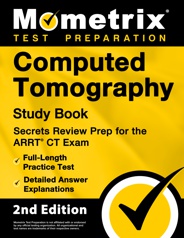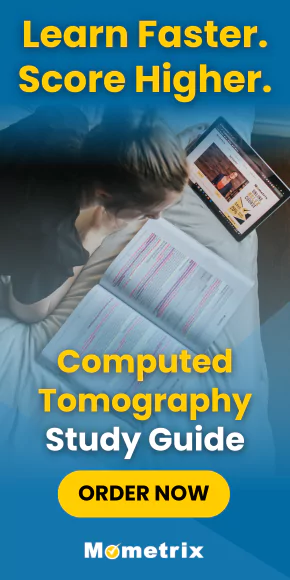The Computer Tomography (CT) exam, which is administered by the American Registry of Radiologic Technologists (ARRT®), is designed to assess the knowledge and skills of prospective CT technologists.
Click “Start Test” above to take a free Computed Tomography practice test!
Computed Tomography Exam Eligibility
To be eligible to take the Computed Tomography exam, you must meet the following education and ethics requirements:
Education
- You must have obtained at least an associate’s degree from an accredited institution.
- You must have completed an AART-verified educational program that applies to computed tomography.
Ethics
- You must not have any felony or misdemeanor charges or convictions.
- You must not have any charges or convictions pertaining to drug- or alcohol-related traffic violations.
- You must not have any convictions in a military court-martial.
- You must not have any standing violations of controlled substance laws.
- You must not have had any disciplinary actions taken regarding a professional certification, permit, license, or registration.
CT Exam Outline
The Computed Tomography exam contains 195 multiple-choice questions, 30 of which are unscored, and you will be given a time limit of 3.5 hours.
The exam is split into four content categories:
1. Patient Care (22 scored questions)
The questions in this category assess your knowledge and skills related to patient interactions and management. These are the topics that are covered by these questions:
Patient Assessment and Preparation
- Patient history
- Patient education
- Patient monitoring
- Interpersonal communication
- Scheduling and screening
- Consent
- Positioning aids for patient safety
- Ergonomics
- Patient transfer techniques
- Accessory medical device management
- Lab values
- Medications and dosages
Contrast and Medication
- Contrast media types and properties
- Noncontrast medications
- Special contrast considerations
- Venipuncture
- Injection techniques
- Administration routes
- Dose calculations
- Post-procedure care
- Infection control
- Adverse reactions
2. Safety (22 scored questions)
The questions in this category assess your knowledge and skills related to radiation safety and dose. These are the topics that are covered by these questions:
Radiation Physics
- X-ray production
- X-ray beam
- Photon interactions with matter
- Target interactions
Radiation Protection
- Minimizing patient exposure
- Patient considerations
- Shielding
- Dose measurements
- Personnel protection
3. Image Production (50 scored questions)
The questions in this category assess your knowledge and skills related to image formation, evaluation, and archiving. These are the topics that are covered by these questions:
Image Formation
Components of a CT Unit
- Gantry
- Array processor
- Host computer
Imaging Parameters
- Pitch
- Peak kilovoltage (kVp)
- Milliampere-seconds (mAs)
- Acquisition slice thickness
- Scan field of view (SFOV)
- Collimation/beam width
- Planes (\(x\), \(y\), and \(z\))
Methods of Data Acquisition
- Volumetric
- Helical
- Axial/sequential
- Dual energy/dual source
- Shuttle/continuous/cine
Image Reconstruction
- Raw data vs. image data
- Filtered back-projection reconstruction
- Retrospective reconstruction
- Iterative reconstruction
- Interpolation
- Reconstruction algorithm
- Reconstruction interval
- Reconstruction slice thickness
Post Processing
- Quantitative analysis
- Multi-planar reformation
- 3D rendering
Image Evaluation and Archiving
Image Display
- Image magnification
- Matrix
- Geometric distance
- Region of interest
- Pixel
- Voxel
- Display field of view (DFOV)
- Cine loop
- Window level
- Window width
Image Quality
- Noise and uniformity
- Contrast resolution
- Linearity
- Spatial resolution
- CT number
- Temporal resolution
- Quality assurance and accreditation
Artifact Recognition and Reduction
- Motion
- Patient positioning
- Metallic
- Beam hardening or cupping
- Edge gradient
- Equipment artifacts
- Partial volume averaging
Informatics
- Archive
- Networking
- Hard copy
- Electronic copy
- Medical image management and processing systems (MIMPS, formerly PACS)
- Electronic medical record (EMR)
4. Procedures (71 scored questions)
The questions in this category assess your knowledge and skills related to various procedures. These are the topics that are covered by these questions:
Head
- Sinuses
- Temporomandibular joints
- Temporal bones
- Internal auditory canal
- Orbits
- Maxillofacial and/or mandible
- Brain perfusion
Spine
- Lumbar
- Cervical
- Sacrum/coccyx
- Thoracic
- Post-myelography
Musculoskeletal
- Upper and lower extremities
- Shoulder
- Bony pelvis
- Arthrography
Neck and Chest
- Soft tissue neck
- Larynx
- Chest wall
- Mediastinum
- Heart
- Lungs
- Low-dose lung screening
Abdomen
- Spleen
- Adrenals
- GI tract
- Liver
- Biliary
- Adrenals
- Pancreas
- Kidneys and/or ureters
Pelvis
- Colorectal
- Bladder
- Reproductive organs
These questions may focus on any of the following:
- Cross-sectional anatomy
- Vasculature
- Landmarks
- Pathological considerations
- Imaging planes
- Protocol and patient considerations
- Post-processing presentations
- Indications
- Effects on images
- Scan/prep delay
- Biopsies
- Trauma
- Aspirations
- Drainages
Check Out Mometrix's Computed Tomography Study Guide
Get practice questions, video tutorials, and detailed study lessons
Get Your Study Guide
Registration
To register for the exam, you must apply directly with your state licensing entity. If approved, the state will send you an instruction letter on how to pay exam fees to ARRT.
Once the fee is processed at ARRT, an online Candidate Status Report will be provided. For applications made online, this will be posted to your account within two business days. For paper applications, ARRT will mail the report to you after they process your application.
Once you receive your Candidate Status Report, you may schedule an appointment online through the affiliated Pearson VUE website and search for testing centers near your location with their available examination schedules.
How to Study
Think you aren’t a good test-taker? Maybe on a study-time crunch? Or just don’t know how to begin studying? Mometrix has designed a new Study Secrets course to help every student, no matter what study scenario you are in. Here’s what you’ll find in the Study Secrets Course:
- Techniques to Conquer Procrastination
- Steps to building a Study Plan custom to your learning style
- 7 Effective Note-Taking Methods
- Test-Taking Tips
- Memory Techniques and Mnemonics
- And much more!
Everyone learns differently, so we’ve tailored our Study Secrets Course to ensure every learner has what they need to prepare for their upcoming exam or semester. Click below to check it out!
Test Day
On the day of your exam, you should arrive at the testing center 30 minutes early to allow time for the check-in process. If you arrive late, you will not be able to take the exam and your exam fee will not be refunded. Note that you are the only person that should enter the testing center; no friends or family members are allowed.
Once you arrive, you will be asked to show a form of valid photo ID, sign a digital signature pad, and scan your palm veins for authentication purposes. You will then be asked to leave all personal items in a locker outside the testing room.
Before the exam begins, you will be asked to read and sign the ARRT Rules Agreement and sign a non-disclosure agreement (NDA). Once these are signed, your exam will begin.
You will be permitted a 10-minute break during the exam, but the timer will not be stopped while you are away. Additionally, if you take longer than 10 minutes, an incident report will be filed and investigated.
Exam Scoring
All ARRT exam scores land within a scoring scale ranging from 1 to 99. You pass the exam if you obtain a scaled score of 75 and above.
At the end of your exam, you’ll receive a preliminary score that only you can access online. Within 30 calendar days, ARRT will mail an official score report to the address you submitted for their records. If four weeks go by and you haven’t received your scores, make sure to contact ARRT to notify them.
Check Out Mometrix's Computed Tomography Flashcards
Get complex subjects broken down into easily understandable concepts
Get Your Flashcards
FAQs
Q
How many questions are on the Computed Tomography exam?
A
There are 195 multiple-choice questions on the exam.
Q
How long is the Computed Tomography exam?
A
The time limit for this exam is 3.5 hours.
Q
What is the passing score for the Computed Tomography exam?
A
To pass the exam, you must achieve a scaled score of 75.
Q
How much is the Computed Tomography exam?
A
The application fee for this exam is $225.
ARRT® and R.T.® are registered trademarks owned by The American Registry of Radiologic Technologists. Mometrix.com is not licensed by, endorsed by, or affiliated with The American Registry of Radiologic Technologists.


